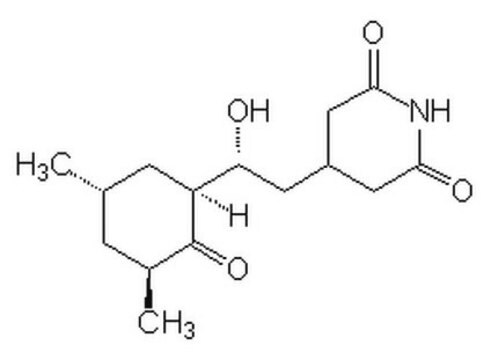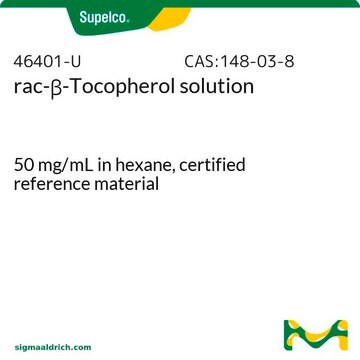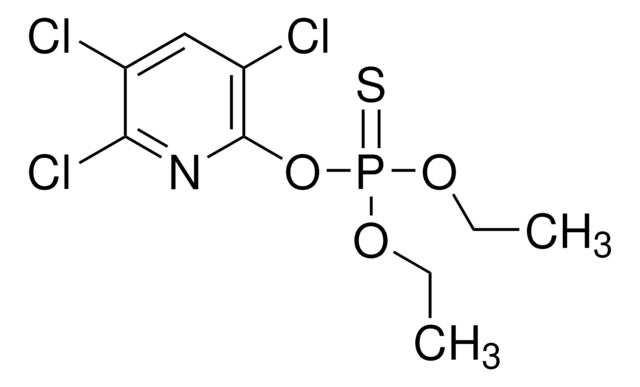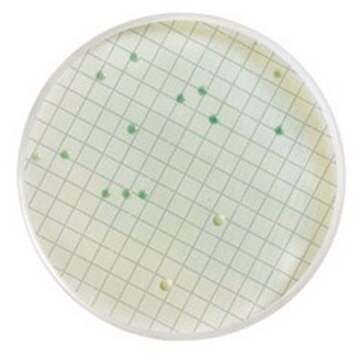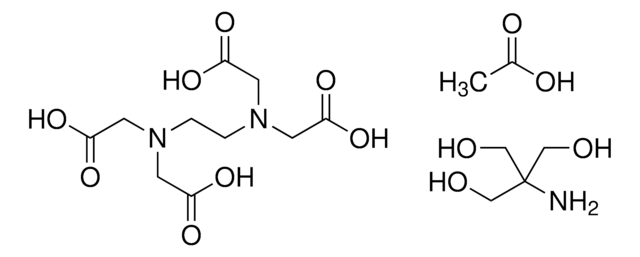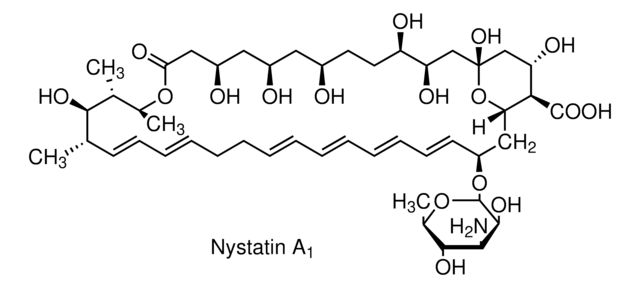46401
Actidion
PESTANAL®, analytical standard
Synonym(e):
3-[2-(3,5-Dimethyl-2-oxocyclohexyl)-2-hydroxyethyl]-glutarimid, Cycloheximid, Naramycin A
About This Item
Empfohlene Produkte
Qualität
analytical standard
Qualitätsniveau
Beschreibung
mixture of stereo isomers
Produktlinie
PESTANAL®
Assay
≥95% (HPLC)
Haltbarkeit
limited shelf life, expiry date on the label
Methode(n)
HPLC: suitable
gas chromatography (GC): suitable
Löslichkeit
H2O: slightly soluble
Wirkungsspektrum von Antibiotika
fungi
Anwendung(en)
agriculture
cleaning products
cosmetics
environmental
food and beverages
personal care
Format
neat
Wirkungsweise
protein synthesis | interferes
Lagertemp.
−20°C
SMILES String
[H][C@]1(C[C@@H](C)C[C@H](C)C1=O)[C@H](O)CC2CC(=O)NC(=O)C2
InChI
1S/C15H23NO4/c1-8-3-9(2)15(20)11(4-8)12(17)5-10-6-13(18)16-14(19)7-10/h8-12,17H,3-7H2,1-2H3,(H,16,18,19)/t8-,9-,11-,12+/m0/s1
InChIKey
YPHMISFOHDHNIV-FSZOTQKASA-N
Suchen Sie nach ähnlichen Produkten? Aufrufen Leitfaden zum Produktvergleich
Allgemeine Beschreibung
As per Regulation (EC) No 1107/2009, repealing the directive 91/414, cycloheximide is not approved for use in the European Union (EU).
Anwendung
- To evaluate the antifungal efficacy and safety of cycloheximide as a supplement in Optisol-GS
- To study the effect of cycloheximide on leaf-cutting ant workers
- To study the effect of streptomycin, cycloheximide, fungizone, captan, carbofuran, cygon, and pentachloronitrobenzene on soil microorganisms
- To study the fungal control of nitrous oxide production in a semiarid grassland
- To study the activity and degradation of streptomycin and cycloheximide in soil
Biochem./physiol. Wirkung
Aktivitätsspektrum: Wirksam gegen Hefen und Pilze wie Candida, Aspergillus, Saccharomyces, Penicillium
Rechtliche Hinweise
Signalwort
Danger
H-Sätze
Gefahreneinstufungen
Acute Tox. 2 Oral - Aquatic Chronic 2 - Muta. 2 - Repr. 1B
Lagerklassenschlüssel
6.1A - Combustible acute toxic Cat. 1 and 2 / very toxic hazardous materials
WGK
WGK 3
Flammpunkt (°F)
Not applicable
Flammpunkt (°C)
Not applicable
Persönliche Schutzausrüstung
Eyeshields, Faceshields, Gloves, type P3 (EN 143) respirator cartridges
Hier finden Sie alle aktuellen Versionen:
Besitzen Sie dieses Produkt bereits?
In der Dokumentenbibliothek finden Sie die Dokumentation zu den Produkten, die Sie kürzlich erworben haben.
Kunden haben sich ebenfalls angesehen
Unser Team von Wissenschaftlern verfügt über Erfahrung in allen Forschungsbereichen einschließlich Life Science, Materialwissenschaften, chemischer Synthese, Chromatographie, Analytik und vielen mehr..
Setzen Sie sich mit dem technischen Dienst in Verbindung.
